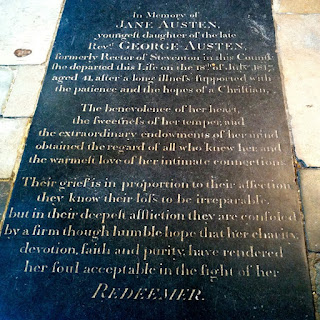- Why could Mr. Collins, a rector, afford to marry a poor woman, while Mr. Elton, a vicar, could not?
- What conflicting religious duties led Elizabeth Bennet to turn down two marriage proposals?
- Why did Mansfield Park’s early readers (unlike most today) love Fanny Price?
- What part did people of color, like Miss Lambe of Sanditon, play in English society?
- How did Austen’s church impact people’s lives and the world?
Fashionable Goodness: Christianity in Jane Austen’s England by Brenda S. Cox answers these questions and many more. It explores:
- Austen’s Church of England, as we see it in her novels
- Challenges the church was facing, reflected in her stories
- Ways the church in Austen’s England transformed England and the world
Comprehensive, yet affordable and easy to read, Fashionable Goodness will help you see Austen’s beloved novels and characters in richer and deeper ways.
Printed biographies and filmed documentaries of the life of Jane Austen are plentiful. Her station in life as the daughter of a country clergyman is routinely mentioned within these productions, and men of the cloth appear frequently within her novels. These two aspects alone seem to indicate that the Christian faith played a prominent role in the life of this beloved author. However, many who lived within the culture of the time practiced what was called a “fashionable goodness” or a reserved level of religious observance which was exhibited by those in “proper society.” It would be reasonable to assume that Jane might have been fashionably good and nothing more. Author and researcher Brenda S. Cox shows in copious detail that this was not the case. Within Fashionable Goodness: Christianity in Jane Austen’s England, Cox not only reveals the vibrant, sincere faith of Jane Austen, but she also elucidates church culture at the time and its effects in England and in literature. The late 18th and early 19th century was a time of tremendous change in England. Christianity was often a part of that, and it can be seen in the life and works of Jane Austen. Fashionable Goodness has brought together a large amount of related information in this regard.
Brenda Cox begins the first third of her work with an overview of Austen’s Church of England. Readers are given insight into the faith of Miss Austen herself, as well as Christian culture of the time. English terms which are still used today have also shifted in their meaning, and Cox explains how such words as “Evangelical”, “serious”, “duty”, and “manners” were utilized differently in that era. As a Christian I also appreciated her examination of Austen’s epitaph (seen in the photo at right). The words penned by Austen’s brother James have concerned me for some time. Near the conclusion of the heartfelt message, there seems to be an implication that it was Jane’s “charity, devotion, faith and purity” which made her “acceptable” to God. Cox clarifies this inscription by stating, “Were they saying that her good works saved her? That’s one interpretation. However, faith is on the list, and her ‘Redeemer’ is given prominence, meaning Christ who died for her sins. . . . [T]he epitaph more likely means that her charity, devotion, and purity showed the reality of her faith. Jane Austen’s family, her writings, and her life affirm that she was a serious, deeply committed Christian.” (p.16) Cox’s evaluation not only makes sense from a biblical standpoint, but as she outlines in Fashionable Goodness, this point of view also aligns with the culture of the time.The second third of this volume focuses upon cultural and religious challenges in Austen’s world. The life of clergymen is given much examination, and specific topics such as female preachers, rented pews and race relations are also discussed. While some congregations may still debate the role of women in ministry today, it hardly seems fathomable that the working poor could not always freely enter churches and sit in any pew they chose. The abolitionist movement is also mentioned with regularity within Fashionable Goodness, highlighting Christianity’s role in working to remove slavery from polite society. Cox discusses the subject and how it finds its way into Austen’s work, such as in Emma and Mansfield Park. The concluding chapter of Cox’s Part Two is particularly of interest for this reader, as I have been working on my master’s degree in Christian Apologetics. The topic of reason vs. feeling is raised often in the world of apologetics, and as Cox discusses, this was also an issue in Austen’s time.
The final third of Fashionable Goodness is a treasure trove of tables, appendices, notes and other resources. Cox also offers more content on her website, BrendaSCox.wordpress.com. This portion of the volume would be of interest to any strong Janeite, but would certainly be invaluable for other researchers or writers of Austenesque fiction.
Fashionable Goodness is a remarkable work, and a labor of love from Brenda S. Cox. Even if the reader does not share Austen’s Christian faith, this resource will be a great asset in coming to understand not only Jane Austen herself, but the time in which she lived. Cox shows her readership that Christianity has historically included those of the “fashionably good” set, but there is so much more to this faith than mere religion. As we see in the life of Jane Austen, Christianity is a vibrant relationship with the Creator, a part of a saving faith that is given by God’s grace. Through that grace we can be made “good” through Christ and affect the world in a positive way, much like Austen herself did.
About the Author



Thanks so much, Laura! If anyone has questions, I'll be happy to answer them here.
ReplyDelete